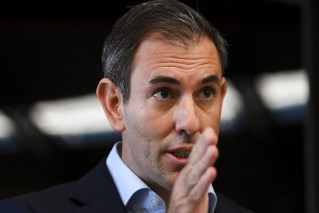Women show the way as virus forces companies to push the pace of change
The COVID pandemic has wrecked business models around the world but it has also forced companies to push through the “change inertia’’ and to act quickly.


Femeconomy founder Jade Collins
A She’s On Q webinar, conducted by QSuper, found that of the 700 attendees 51 per cent worked for a company that had completely changed the way it operated, 49 per cent said their workplace had made some changes and 1 per cent said their workplace had no change at all.
Femeconomy founder Jade Collins said Covid had also been an accelerator and some of her members had benefitted from the change.
“It has been really different across our membership. We have had members in the arts, hospitality, retail and events, those industries are really suffering, and they’ve had to do complete pivots and, in some cases, shut down. Whereas others have been booming and doing really well, so this pandemic is different for everyone,’’ she said.
Womens’ Fitness Adventures sped up plans to move online and Edible Beauty, which markets organic skincare, adopted a hand sanitiser.
Even online divorce companies had seen a surge in business because of the inability to travel to traditional law firms and because of the increase in divorce rates after being forced to spend so much time together.
“We have seen big business supporting regional businesses. One of our members in Rockhampton, an environmental consultant, has picked up mining clients because they are there on the spot when others were not able to travel,” Collins said.
“She Wear, a manufacturer of work boots and PPE for women, launched a shoe range to support health care and hospital workers.’’
“What COVID has done is push through the change inertia and change resistance in most organisations, particularly large organisations.
“Gartner HR surveyed organisations to see what the response was about flexible or remote working and 88 per cent said they had instituted remote working and 74 per cent said they would continue to offer remote working going forward.’’
QSuper’s general manager of human resources Kylie Robinson said the organisation had seen a number of innovations both small and large.
“You just need to adapt to whatever the issue. There was no playbook for this but I think for us our culture helped. Our members were always at the heart of it,’’ she said.
“If you said QSuper was planning to have everyone work remotely in a week it would normally take a lot of planning to ensure there was no loss of service to the members.
“But with this we knew we had to move. Within a week we staged how people worked remotely. You just become a lot more agile at responding quickly.
“The decision-making became a lot easier. Because of Covid we had to make sure our people were safe and then be there for the members.
“We just responded quickly but we had been working on our technology for a number of years so we were enabled to do this.’’
She said because of social distancing only about half of the 1000 QSuper staff would return to the office at any one time.
“We have people say they enjoyed working remotely and those that wanted a combination of both. We have established now we can have people working remotely at a larger scale than what we had previously.”
The Royal Flying Doctor’s head of people and culture, Judy Hawkins said she thought Telehealth would remain a fixture after COVID, as would the new ways of working.
“Our patients and the people in rural and remote areas of Queensland have benefited (from Telehealth) because we haven’t had to transport them out of their home, they have been able to Telehealth in,” she said.
“It has also supported our ability to continue to retain our staff who normally fly in and fly out who have been restricted as a result of the border closures. We have been able to engage them and continue to offer them employment.”
“Decoupling productivity from location is the new thing. If you don’t want to work in the office you don’t need to, but I think on the whole the majority will want a bit of both. It is good to have that connectedness that comes with face- to-face in the office.”












